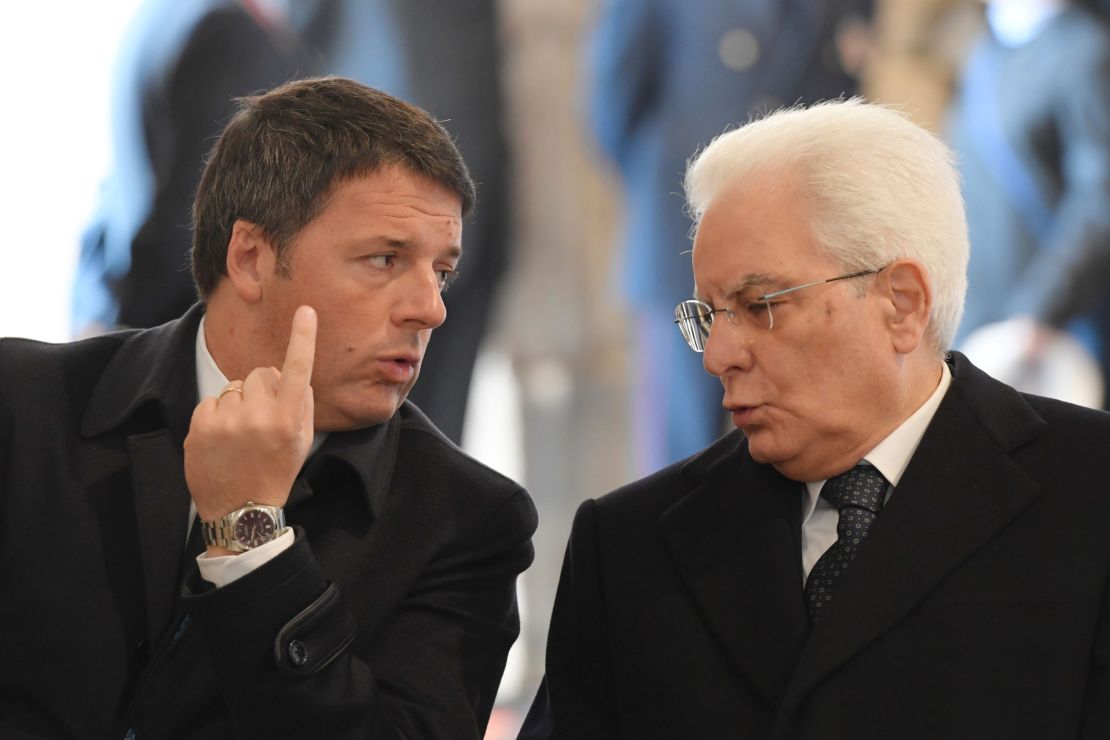Story highlights
NEW: Renzi met with the President to offer his resignation
President to decide whether to hold snap elections
Italian Prime Minister Matteo Renzi met with Italy’s President Sergio Mattarella on Monday to offer his resignation. But he was asked to stay until the country’s budget is approved.
Renzi’s offer to resign comes after suffering a crushing referendum defeat Sunday that could transform the country’s political and economic landscape.
The 41-year-old, who was appointed to office in 2014, arranged to meet with President Sergio Mattarella hours after close to 60% of voters rejected his plans for constitutional reform.
As the result reverberated around the country and the continent, the euro fell to a 20-month low against the dollar and dragged Italy toward more financial pain.
The prospect of instability in the eurozone’s third biggest economy saw the currency drop about 1% against the dollar to around $1.05 in Asia trading. It trimmed those losses later in the day.
The decisive outcome, with a 70% turnout, is considered a notable victory for eurosceptic populist and nationalist parties, which campaigned heavily against Renzi and his promise to stimulate Italy’s sluggish economy.
The ‘No’ campaign was spearheaded by the anti-establishment Five Star Movement party, led by Beppe Grillo, which is expected to make substantial gains if a general election is called.
“When you lose you cannot pretend that nothing has happened and go to bed and sleep. My government ends here today,” Renzi said Sunday.
Next steps
Italy’s path will become clearer as the week progresses. According to Italy’s ANSA news agency, the budget law could be approved by Friday.
But Renzi’s decision to resign brings with it yet more uncertainty. There is the possibility, for example, that a caretaker administration could be appointed to keep the country running until the 2018 elections.

That could see the likes of finance minister Pier Carlo Padoan or even Pietro Grasso, the Senate leader, take over as prime minister.
And while unlikely, there is also a scenario in which the Italian Parliament is dissolved and a snap election is called.
Europe reacts
As Europe awoke to the result, leading figures began to react to the latest installment of political change.
Outgoing French President Fran?ois Hollande paid tribute to Renzi and his attempt to pass “courageous reforms.”
A statement from the élysée Palace said that Hollande shared Renzi’s will to “steer Europe to growth and employment.”
In Brussels, European Commissioner for economic and financial affairs Pierre Moscovici said he remained convinced the Italian authorities would deal with the situation.
“Italy is a strong country, a reliable country,” he said, adding that he did not expect an economic crisis.
He also insisted the result was not an anti-Europe or an anti-EU vote.
German Finance Minister Wolfgang Sch?uble added that he expected Italy to “make the best of it,” while president of the Eurogroup, Jeroen Dijsselbloem, rejected accusations that the result would radically affect the economic situation within the country.
What was it all about?
At its core, this vote was a referendum on whether or not Italy should amend its 1948 constitution.
Renzi wanted to reduce the power of the Senato, the upper chamber of the Italian Parliament, by slashing its numbers from 315 to 100 – making it more of a consultative assembly.
Proponents of the referendum said that the goal was to make the job of governing Italy less complicated and that the reforms would help revive the nation’s lethargic economy.
However, critics claimed the reforms would impact the constitution’s checks and balances and give the prime minister too much power.
Elly Schlein, an Italian member of the European Parliament, said the proposed reforms would have transferred too much power into the hands of the ruling party.
“It was shifting power from the regions to the center in a really unbalanced way,” she said. “It was a dangerous reform for the roots of our democratic system.”
However, the referendum was widely considered a litmus test for the rising wave of populism spreading in Europe, and the chance to register discontent with the current government.
This, according to Schlein, was Renzi’s “completely unnecessary” mistake. She said that personalizing and dramatizing the vote meant that many of the people who voted “No” – particularly the younger voters – did so for political reasons beyond the context of the reform and its consequences.
“The vote was transformed into a vote on himself and his government,” she said.
‘A lost opportunity’
In Rome, emotions ranged from elation to extreme disappointment.
“I believe this was a lost opportunity for our country,” Lino Settola, director of a private company, told CNN.
“What interested me was speeding up the process of passing laws and not continuing the ping pong between the House of Representatives and Senate, waiting years before things happen.
“This referendum would have helped speed this process up.”

Giuseppe Cazuolo, a photographer from Rome, was equally concerned by the result.
“What will happen is that the people who have governed Italy will return but nothing will happen,” he said.
“It’s too soon to say who will take power, but everything is in the hands of the President of the Republic now.”
He added, “I have faith in him, he is a person that Italians love because you can see he is a professional person.”
Another voter, Alex, said that Renzi’s mistake was making the referendum too political.
He also cited a frustration with Brussels and being governed by EU law as another area that caused political angst.
“I voted no, but I think people want a real change,” Alex told CNN.
“They don’t want just a political change, but a change where things really happen. I think the referendum was too political and Renzi made an error.”
CNN’s Hada Messia in Rome, Mark Thompson in London and Jeanne Bonner in Atlanta contributed to this report.


